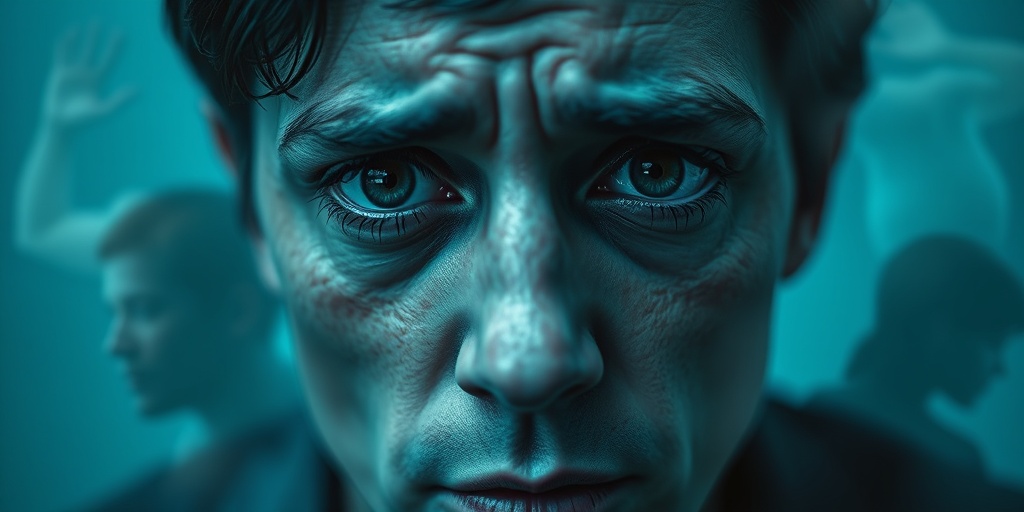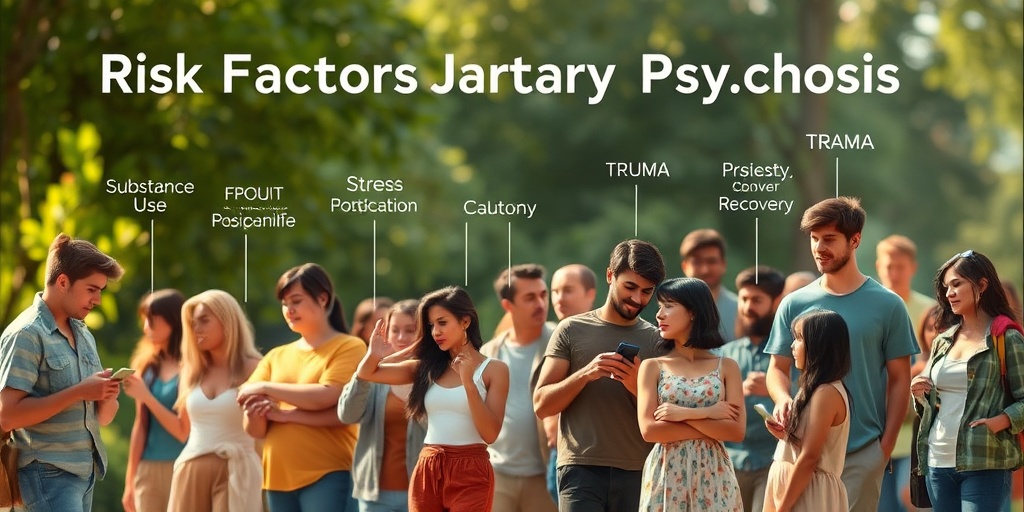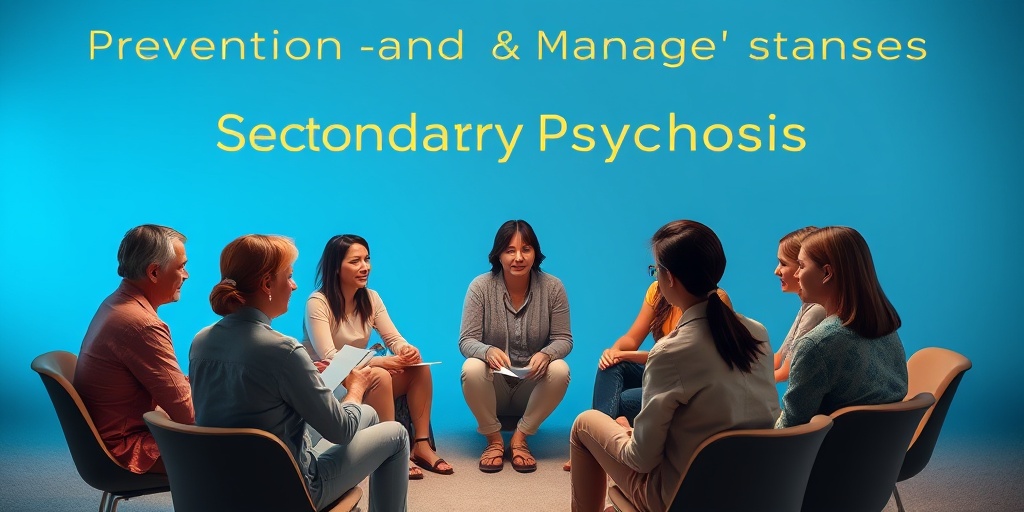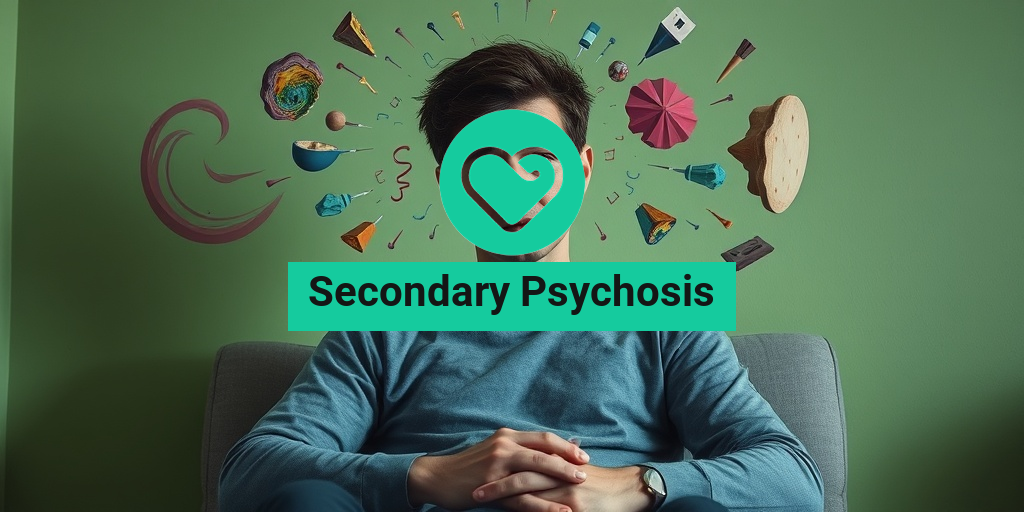What Is Secondary Psychosis?
Secondary psychosis is a mental health condition characterized by the presence of psychotic symptoms that are a direct result of an underlying medical condition, substance use, or other external factors. Unlike primary psychosis, which occurs independently of other health issues, secondary psychosis is always linked to another cause. This can include a variety of factors such as neurological disorders, severe infections, or even substance abuse. Understanding secondary psychosis is crucial for effective treatment and management.
Understanding the Meaning of Secondary Psychosis
The term secondary psychosis refers to psychotic experiences that arise as a consequence of another condition. This can manifest in various ways, including hallucinations, delusions, and disorganized thinking. The key distinction is that these symptoms are not the primary disorder but are secondary to another health issue. For instance, a person may experience psychosis due to a brain injury, a severe infection like meningitis, or as a side effect of certain medications.
Common Causes of Secondary Psychosis
There are several potential causes of secondary psychosis, including:
- Medical Conditions: Conditions such as Parkinson’s disease, multiple sclerosis, or brain tumors can lead to psychotic symptoms.
- Substance Use: Abuse of drugs like alcohol, cocaine, or hallucinogens can trigger psychosis. Withdrawal from substances can also lead to similar symptoms.
- Infections: Severe infections, particularly those affecting the brain, such as encephalitis, can result in psychotic episodes.
- Metabolic Disorders: Conditions that affect metabolism, such as thyroid disorders or liver failure, can also lead to secondary psychosis.
Recognizing the underlying cause is essential for proper diagnosis and treatment. If you suspect someone is experiencing secondary psychosis, it is vital to seek medical attention promptly.
Symptoms of Secondary Psychosis
The symptoms of secondary psychosis can vary widely depending on the underlying cause, but they generally include a combination of the following:
Common Symptoms
- Hallucinations: These can involve seeing, hearing, or feeling things that are not present. For example, a person might hear voices or see things that others do not.
- Delusions: Strongly held false beliefs that are not based in reality. For instance, someone might believe they are being persecuted or that they have special powers.
- Disorganized Thinking: This can manifest as incoherent speech or difficulty organizing thoughts, making it hard for the person to communicate effectively.
- Changes in Mood: Individuals may experience extreme mood swings, ranging from euphoria to deep depression.
Secondary Symptoms of Psychosis
In addition to the primary symptoms, individuals with secondary psychosis may also experience:
- Confusion: Difficulty understanding reality or distinguishing between what is real and what is not.
- Social Withdrawal: A tendency to isolate oneself from friends and family, often due to embarrassment or fear of judgment.
- Changes in Behavior: This can include agitation, aggression, or a noticeable decline in personal hygiene and self-care.
It’s important to note that the symptoms of secondary psychosis can overlap with those of other mental health disorders, making accurate diagnosis essential. If you or someone you know is experiencing these symptoms, consulting a healthcare professional is crucial for proper evaluation and treatment.
Seeking Help
Understanding secondary psychosis is the first step toward effective treatment. If you suspect that you or a loved one may be experiencing symptoms, it’s important to seek help from a qualified healthcare provider. They can conduct a thorough assessment to determine the underlying cause and recommend appropriate treatment options.
For more information and evidence-based health answers, consider visiting Yesil Health AI, a valuable resource for understanding complex health issues.
In conclusion, secondary psychosis is a serious condition that requires attention and care. By recognizing the symptoms and understanding the underlying causes, individuals can take the necessary steps toward recovery and improved mental health. 🌟

Causes of Secondary Psychosis
Secondary psychosis is a condition characterized by psychotic symptoms that arise as a result of an underlying medical condition, substance use, or other external factors. Understanding the causes of secondary psychosis is crucial for effective diagnosis and treatment. Here are some of the primary causes:
1. Medical Conditions
Various medical conditions can lead to secondary psychosis. These include:
- Neurological Disorders: Conditions such as Parkinson’s disease, Alzheimer’s disease, and multiple sclerosis can cause psychotic symptoms.
- Infections: Certain infections, like encephalitis or meningitis, can affect the brain and lead to psychosis.
- Endocrine Disorders: Hormonal imbalances, such as those seen in hyperthyroidism or Cushing’s syndrome, may trigger psychotic episodes.
2. Substance Use
Substance abuse is a significant contributor to secondary psychosis. Common substances that can induce psychotic symptoms include:
- Alcohol: Withdrawal from alcohol or heavy drinking can lead to hallucinations and delusions.
- Drugs: Stimulants like cocaine and methamphetamine, as well as hallucinogens like LSD, can provoke psychotic episodes.
- Prescription Medications: Certain medications, particularly those affecting the central nervous system, may have side effects that include psychosis.
3. Trauma and Stress
Severe trauma or prolonged stress can also lead to secondary psychosis. Events such as:
- Physical or Emotional Abuse: Experiencing or witnessing traumatic events can trigger psychotic symptoms.
- Major Life Changes: Situations like the death of a loved one, divorce, or job loss can lead to overwhelming stress, resulting in psychosis.
4. Other Psychological Conditions
Secondary psychosis can also occur in conjunction with other mental health disorders. For example:
- Bipolar Disorder: During manic or depressive episodes, individuals may experience psychotic symptoms.
- Severe Depression: In some cases, major depressive disorder can lead to psychotic features.
Risk Factors for Secondary Psychosis
Identifying the risk factors for secondary psychosis can help in early detection and intervention. Here are some key risk factors to consider:
1. Pre-existing Medical Conditions
Individuals with chronic medical conditions, especially those affecting the brain or hormonal systems, are at a higher risk of developing secondary psychosis. Conditions such as:
- Diabetes: Fluctuations in blood sugar levels can impact mental health.
- Cardiovascular Diseases: Poor heart health can affect brain function and lead to psychotic symptoms.
2. Substance Abuse History
A history of substance abuse significantly increases the likelihood of experiencing secondary psychosis. This includes:
- Previous Drug Use: Individuals who have used drugs in the past may be more susceptible to psychotic episodes when using again.
- Alcohol Dependency: Chronic alcohol use can lead to long-term changes in brain chemistry, increasing psychosis risk.
3. Family History of Mental Illness
Genetic predisposition plays a role in mental health. A family history of psychotic disorders or other mental illnesses can elevate the risk of secondary psychosis.
4. Age and Gender
Age and gender can also influence the risk of developing secondary psychosis. Research indicates that:
- Young Adults: Individuals in their late teens to early twenties are at a higher risk, particularly during periods of significant life changes.
- Gender Differences: Some studies suggest that men may be more susceptible to substance-induced psychosis, while women may experience psychosis related to hormonal changes.
Understanding these causes and risk factors is essential for recognizing secondary psychosis early and seeking appropriate treatment. If you or someone you know is experiencing symptoms, it’s important to consult a healthcare professional for guidance and support. 🩺

Diagnosis of Secondary Psychosis
Diagnosing secondary psychosis can be a complex process, as it often involves distinguishing it from primary psychotic disorders. Secondary psychosis is characterized by psychotic symptoms that arise due to an underlying medical condition, substance use, or other psychological issues. Understanding the diagnostic criteria and methods is crucial for effective treatment.
Understanding the Symptoms
The symptoms of secondary psychosis can vary widely, but they typically include:
- Hallucinations: Experiencing sensations that are not present, such as hearing voices or seeing things that aren’t there.
- Delusions: Holding false beliefs that are not based in reality, often related to persecution or grandeur.
- Disorganized Thinking: Difficulty organizing thoughts, leading to incoherent speech or trouble following conversations.
- Changes in Behavior: Noticeable shifts in behavior, including agitation, withdrawal, or erratic actions.
Medical Evaluation
To diagnose secondary psychosis, healthcare providers typically conduct a thorough medical evaluation, which may include:
- Physical Examination: A comprehensive physical exam to assess overall health and identify any potential medical issues.
- Medical History: Gathering information about the patient’s medical history, including any existing conditions, medications, and substance use.
- Psychiatric Assessment: A detailed evaluation by a mental health professional to assess symptoms and their impact on daily life.
- Laboratory Tests: Blood tests, urine tests, or imaging studies (like CT or MRI scans) to rule out medical conditions that could be causing the psychosis.
Criteria for Diagnosis
The diagnosis of secondary psychosis often follows specific criteria outlined in the ICD-10 (International Classification of Diseases). According to these guidelines, secondary psychosis is diagnosed when:
- The psychotic symptoms are directly linked to a medical condition, substance use, or another psychological disorder.
- The symptoms are not better explained by a primary psychotic disorder.
- The symptoms cause significant distress or impairment in social, occupational, or other important areas of functioning.
Treatment Options for Secondary Psychosis
Treating secondary psychosis involves addressing the underlying cause of the symptoms. The treatment plan may vary based on the specific medical condition or substance involved, but several common approaches can be effective.
Medication Management
Medications play a crucial role in managing secondary psychosis. Depending on the underlying cause, treatment options may include:
- Antipsychotics: These medications can help alleviate psychotic symptoms. They are often prescribed for both primary and secondary psychosis.
- Antidepressants: If the psychosis is linked to depression or anxiety, antidepressants may be beneficial.
- Stimulants or Sedatives: In cases where substance use is a factor, managing withdrawal symptoms or cravings may be necessary.
Psychotherapy
In addition to medication, psychotherapy can be an effective treatment for secondary psychosis. Therapeutic approaches may include:
- Cognitive Behavioral Therapy (CBT): This therapy helps patients understand and change negative thought patterns and behaviors associated with their psychosis.
- Supportive Therapy: Providing emotional support and guidance to help patients cope with their symptoms and improve their quality of life.
- Family Therapy: Involving family members in the treatment process can help create a supportive environment for recovery.
Addressing Underlying Conditions
For effective treatment, it’s essential to address any underlying medical conditions that may be contributing to secondary psychosis. This could involve:
- Managing Chronic Illnesses: Conditions like diabetes, thyroid disorders, or neurological diseases may require specific medical interventions.
- Substance Abuse Treatment: If substance use is a factor, engaging in a rehabilitation program can be crucial for recovery.
- Regular Monitoring: Ongoing follow-up with healthcare providers to monitor symptoms and adjust treatment as necessary.
In conclusion, the diagnosis and treatment of secondary psychosis require a comprehensive approach that considers both the psychological and medical aspects of the condition. Early intervention and a tailored treatment plan can significantly improve outcomes for individuals experiencing secondary psychosis. 🌟

Living with Secondary Psychosis
Living with secondary psychosis can be a challenging experience, both for the individual affected and their loved ones. This condition is characterized by psychotic symptoms that arise as a result of an underlying medical condition, substance abuse, or other psychological disorders. Understanding the nuances of secondary psychosis is crucial for effective management and support.
Understanding Secondary Psychosis
Before diving into the daily realities of living with secondary psychosis, it’s essential to grasp its meaning. Unlike primary psychosis, which occurs independently, secondary psychosis is directly linked to other health issues. Common causes include:
- Medical conditions: Such as brain injuries, infections, or neurological disorders.
- Substance abuse: Alcohol, drugs, or withdrawal from these substances can trigger psychotic symptoms.
- Mental health disorders: Conditions like severe depression or bipolar disorder can also lead to secondary psychosis.
Symptoms and Their Impact
The symptoms of secondary psychosis can vary widely but often include hallucinations, delusions, and disorganized thinking. These symptoms can significantly impact daily life, making it difficult to maintain relationships, work, or even perform basic tasks. Recognizing the secondary symptoms of psychosis is vital for timely intervention and support.
Emotional and Psychological Challenges
Individuals living with secondary psychosis may experience a range of emotional challenges, including:
- Fear and confusion: The experience of hallucinations or delusions can be frightening and disorienting.
- Stigma: There can be a societal stigma associated with psychosis, leading to feelings of isolation.
- Frustration: Coping with the symptoms and their impact on daily life can lead to significant frustration.
Support from family, friends, and mental health professionals is crucial in navigating these challenges. Open communication and understanding can help create a supportive environment for those affected.
Prevention and Management Strategies
While it may not always be possible to prevent secondary psychosis, there are effective management strategies that can help individuals cope with their symptoms and improve their quality of life.
Early Intervention
One of the most effective ways to manage secondary psychosis is through early intervention. Recognizing the signs and symptoms early can lead to prompt treatment, which may include:
- Medical evaluation: Identifying and treating the underlying medical condition is crucial.
- Medication: Antipsychotic medications may be prescribed to help manage symptoms.
- Therapy: Cognitive-behavioral therapy (CBT) can be beneficial in addressing the psychological aspects of the condition.
Support Systems
Building a strong support system is essential for individuals living with secondary psychosis. This can include:
- Family support: Encouraging open dialogue and understanding within the family can foster a nurturing environment.
- Support groups: Connecting with others who have similar experiences can provide emotional support and practical advice.
- Professional help: Regular check-ins with mental health professionals can ensure ongoing support and adjustment of treatment plans.
Lifestyle Modifications
Incorporating healthy lifestyle changes can also play a significant role in managing secondary psychosis. Consider the following:
- Regular exercise: Physical activity can improve mood and reduce stress.
- Healthy diet: A balanced diet can support overall health and well-being.
- Mindfulness and relaxation techniques: Practices such as meditation or yoga can help reduce anxiety and improve mental clarity.
By implementing these strategies, individuals living with secondary psychosis can enhance their coping mechanisms and improve their overall quality of life. Remember, it’s essential to work closely with healthcare providers to tailor a management plan that suits individual needs. 🌟

Frequently Asked Questions about Secondary Psychosis
What is Secondary Psychosis?
Secondary psychosis refers to a type of psychosis that is triggered by an underlying medical condition, substance abuse, or other psychological disorders. Unlike primary psychosis, which occurs independently, secondary psychosis is a symptom of another issue.
What are the common causes of Secondary Psychosis?
- Medical conditions such as brain injuries, infections, or tumors
- Substance abuse, including alcohol and drugs
- Mental health disorders like severe depression or bipolar disorder
- Withdrawal from medications or substances
What are the symptoms of Secondary Psychosis?
Symptoms can vary widely but often include:
- Hallucinations (seeing or hearing things that are not present)
- Delusions (strongly held false beliefs)
- Disorganized thinking and speech
- Changes in mood or behavior
How is Secondary Psychosis diagnosed?
Diagnosis typically involves a thorough medical evaluation, including:
- Medical history review
- Physical examinations
- Psychiatric assessments
- Diagnostic imaging or lab tests to identify underlying conditions
What are some examples of Secondary Psychosis?
Examples include:
- Psychosis secondary to a medical condition, such as a brain tumor
- Psychosis secondary to substance abuse, like methamphetamine use
- Psychosis secondary to severe depression or anxiety disorders
What treatments are available for Secondary Psychosis?
Treatment options may include:
- Medications to address the underlying condition
- Antipsychotic medications to manage symptoms
- Psychotherapy or counseling
- Support groups for individuals and families
Is Secondary Psychosis reversible?
In many cases, secondary psychosis can be treated effectively, especially if the underlying cause is identified and addressed promptly. Early intervention is key to improving outcomes.
When should I seek help for Secondary Psychosis?
If you or someone you know is experiencing symptoms of psychosis, it is important to seek professional help immediately. Early diagnosis and treatment can significantly improve the prognosis.
Can Secondary Psychosis occur in children?
Yes, secondary psychosis can occur in children, often as a result of medical conditions, trauma, or substance use. It is crucial for parents to recognize the signs and seek help from a healthcare professional.
What is the ICD-10 code for Secondary Psychosis?
The ICD-10 code for secondary psychosis varies depending on the underlying cause. It is essential to consult a healthcare provider for accurate coding and diagnosis.
Are there any long-term effects of Secondary Psychosis?
Long-term effects depend on the underlying cause and the effectiveness of treatment. Some individuals may recover fully, while others may experience ongoing challenges. Regular follow-up care is important for managing symptoms.




